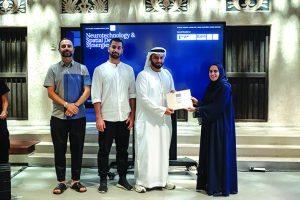DUBAI / GULF TIME
Dubai Culture and Arts Authority (Dubai Culture) recently hosted the Global Summer School (GSS) – Dubai Node Programme by the Institute for Advanced Architecture of Catalonia (IAAC). As part of a global initiative held across ten cities worldwide throughout the summer, the Dubai Node aimed to empower participants by encouraging creative thinking and developing new skills. Held at the Shindagha Museum, the UAE’s largest heritage museum, and supported by the Sikka Platform, the event aligns with Dubai Culture’s mission to strengthen the cultural and creative industries and reinforce the emirate’s position as a global centre for culture, an incubator for creativity, and a thriving hub for talent.
Held under the theme, ‘Brain-Computer Interfaces and Spatial Design Synergies: Prototyping the Future of Human-Machine Interaction,’ the programme brought together UAE-based creatives, professionals, and university students. Attendees shared ideas and practical know-how while exploring how architecture, design, neuroscience, artificial intelligence, and media arts can influence the future.
Spanning two weeks, the programme became an interactive lab for experimentation and discovery. During ‘Exploration Week,’ participants worked with advanced tools in neurotechnology, AI, and spatial design, transforming concepts into dynamic prototypes. Through hands-on workshops, they explored brain-computer interfaces and learned how to build intelligent systems that respond to brain signals. The sessions covered topics such as generative AI and augmented reality (AR/VR), culminating in the creation of real-time, responsive models.
During ‘Final Integration Week,’ the group applied their newly acquired skills to develop a collaborative project.
The finished work was unveiled in a live public showcase, illustrating how technology, combined with human-centered design, can foster transformative interactions. The programme concluded with an engaging presentation where experts and enthusiasts interacted with the final prototype, which demonstrated the cohort’s ability to turn emerging tech into a medium of expression and to use design as a dialogue between people and their surroundings.
Commenting on the event, Khulood Khoory, Director of the Projects and Events Department at Dubai Culture, emphasised that Dubai’s focus on innovation and digital technologies has
positioned it as a testbed for new ideas. She said: “Technology alone doesn’t shape the future—it’s the minds that know how to harness it for humanity’s benefit that do. This was evident in the projects showcased at the conference, which reimagined the interaction between humans and machines through intelligent systems that respond to neural signals and dynamically transform environments in
real-time. Hosting the Global Summer School – Dubai Node alongside nine other cities further underscores Dubai’s leadership and international presence.” She added that the initiative reflects Dubai Culture’s commitment to offering enriching learning opportunities that help individuals develop their skills, unlock their potential, and take an active role in shaping what lies ahead. The programme also supports the Dubai Design Sector Strategy 2033, which aims to position Dubai as a global hub of design excellence and a premier destination for leading designers, creatives, and industry experts.
The Global Summer School is a renowned educational programme held annually for over 14 years across multiple cities worldwide. It delivers advanced learning at the intersection of design, technology, and spatial development. Dubai’s participation in this edition marks a significant step in strengthening its role within IAAC’s global network and enhancing its position as a regional centre for knowledge and innovation. This involvement underscores the city’s forward-looking approach, blending creativity, technology, and international cultural exchange.
 The Gulf Time Newspaper One of the finest business newspapers in the UAE brought to you by our professional writers and editors.
The Gulf Time Newspaper One of the finest business newspapers in the UAE brought to you by our professional writers and editors.
